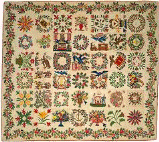Textile Society of America

Textile Society of America: Symposium Proceedings
Date of this Version
2010
Document Type
Article
Abstract
In this paper I will discuss the intersections of art and history with a focus on family and community and will examine immigration, resettlement, loyalty, and mental health concepts in a traditional Chinese American perception.
During my 30 year career as an artist, I have used oral history as a foundation to explore the impact of the 1882 Chinese Exclusion Law on my family and community, including later immigrants; I have transformed these little-known chronicles into art that speaks to the universality of adjustment to space and place. The iconic materials that I have used to convey these narratives are cloth Diamond Double A rice sacks, canvases no longer being manufactured to package rice.
In particular, I will be showing images from my installations entitled the Baby Jack Rice Story, which narrates the memory of my husband‘s (Edward K. Wong) tri-cultural African American, Chinese American, and white-childhood during segregation in Augusta, Georgia, made in usa: Angel/sland Shhh, an exploration of identity secrets of paper people, Chinese immigrants who entered this country under false identities and who were subsequently detained and interrogated, Kindred Spirit, an inquiry of the 1999 wrongful incarceration of nuclear scientist, Wen Ho Lee, who was accused of mishandling sensitive nuclear secrets, and My Sister: Li Hong, a personal probe into the resilient story of my 87 year old developmentally-challenged sister.
These extraordinary stories of ordinary people, created on Diamond Double A rice sacks, are sagas that deserve a place in the American landscape of art. They have transformed me, the creator, and the stakeholders, those who have told their stories publicly (some for the first time). As a result, we are healing from these challenging and shameful American experiences that we once hid from ourselves and others.


Comments
Presented at “Textiles and Settlement: From the Plains Space to Cyber Space,” Textile Society of America 12th Biennial Symposium, Lincoln, Nebraska, October 6-9, 2010. Copyright 2010 Textile Society of America